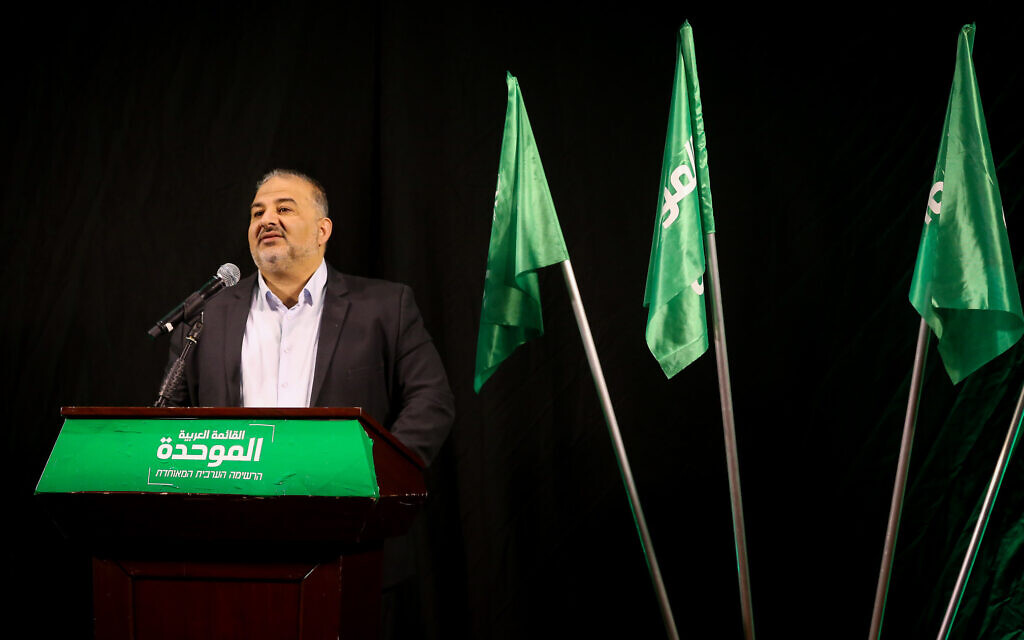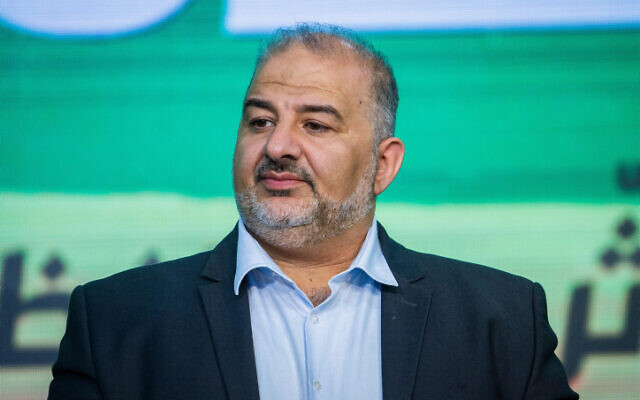Islamist Ra’am’s support of a right-wing coalition would be astonishing. But if the center-left had been more willing to buck norms, Ayman Odeh may have been in Abbas’s shoes today

“Now is the time for change,” the conservative Islamist told his Hebrew-speaking audience, framed by green flags.
Large chunks of Jewish Israel swooned.
Love him or hate him, Mansour Abbas has proven himself to be an adept politician. He has defied expectations at every turn: first, breaking off from the Joint List alliance rather than submit to party orders; then, running a disciplined electoral campaign that carried his party, all on its lonesome, well over the voter threshold.
Now Abbas seems poised to complete his hat trick: to make his Arab Israeli party an active player in a right-wing government. And not just any right-wing government, but one run by Prime Minister Benjamin Netanyahu, who is widely reviled among Arab Israelis for years of race-baiting remarks and advancing legislation denounced as discriminatory.
To do so, Abbas knew he needed a dramatic speech, one that could reset the way the Jewish public in Israel views him. And so he devoted his remarks to calls for peace and reconciliation. Amid talk of respecting all people for their humanity, one could forget his party’s virulent opposition to gay rights.

“I carry a prayer of hope, and the search for coexistence based on mutual respect and genuine equality,” Abbas said. “What we have in common is greater than what divides us.”
Abbas carefully avoided mentioning the Palestinian cause, although he did stress that Jews needed to understand Arab Israelis’ narratives. But don’t be misled: Abbas has not forgotten the Palestinians, his associates say. He is pragmatic and strategic and will fight that battle another day.
Changing of the guard
The speech also showed that a new balance of power has taken shape in Arab Israeli politics. For years, Arab Israel’s largest party, Hadash, dictated the Arab Israeli political agenda and its members controlled important communal institutions.
Ayman Odeh, the head of Hadash, leads the Joint List alliance of Arab parties — making him perhaps the most widely known Palestinian citizen of Israel in the Knesset, both in Israel and around the world.
But in the past election, Hadash received only three Knesset seats (out of the Joint List’s total of six) to Ra’am’s four. In his speech on Thursday night, Abbas shoved the knife in deeper.
“I, Mansour Abbas, a man of the Islamic Movement, am a proud Arab and Muslim, a citizen of the state of Israel, who heads the leading, biggest political movement in Arab society,” Abbas said, a reference to his victory over Hadash.
Odeh has ceaselessly preached the values of Arab-Jewish partnership, coexistence, equality, and mutual respect. But he has done so on terms unacceptable until now to Jewish Israeli politicians, as he refuses to compromise on invoking the Palestinian national cause. Nor would he have ever have considered sitting with Netanyahu.
But the Joint List head had to be clenching his fists while watching Thursday night’s broadcast from Nazareth. After all, if the center-left had been either as courageous or as desperate as Netanyahu may well be today, it could have been Odeh standing on that platform last year, seeking to usher in a new era in Arab-Jewish relations within the Green Line.

After Israel’s third quick-fire election in March 2020, Odeh’s Joint List alliance of mostly Arab parties skyrocketed to an unprecedented 15 seats in the Knesset. With enthusiasm running high, the Joint List nominated Blue and White leader Benny Gantz for the premiership — only to see Gantz give them the cold shoulder and enter a coalition with Netanyahu.
The center-left parties on which Odeh and his fellow parliamentarians had staked their newfound political strength and credibility had been unwilling to respond in kind. Embittered and despairing, the Arab electorate’s support for the Joint List plunged and voter apathy rose.
Ra’am’s political worldview was shaped by this disaster. Ra’am voters and parliamentarians have expressed deeply cynical views of both the left and the right.
But unlike the Joint List, some of whose members seem to have become more wary of supporting Zionist politicians, Ra’am took its conclusion to the opposite pole. The seemingly mercenary nature of Ra’am’s politics comes not from any newfound affinity for Netanyahu, but from intense disillusionment with the Zionist center and left.
A Ra’am associate remarked that the Islamists preferred Netanyahu to the anti-Netanyahu bloc, who were leaderless and busy fighting ego wars. If Ra’am played a role in a Netanyahu government, even from outside, even for a short time — that might be enough to make the Arab parties legitimate forever, he said.

But as for their view of the Zionist left and right, interests aside? Ra’am members have few positive things to say.
“I’m telling you, both [camps] are bad. But at the end of the day, we have demands,” said incoming Ra’am MK Mazen Ghanaim when asked which he preferred — the bloc that supports Netanyahu or the one that opposes him.
Abbas told Israel Thursday evening that he did not wish to be seen as a kingmaker, despite having used the phrase repeatedly himself in interviews leading up to the elections. “We will be the deciding thumb on the scales,” Abbas had told The Times of Israel by a school in his hometown of Maghar on the day of the March 23 elections.
Regardless of who Abbas ends up recommending to form the next government, the revolution in Arab Israeli politics is in full swing. Abbas is now the biggest political player in Arab Israel. The questions now are where this primacy will take him, and how long it will last.
As reported by The Times of Israel
